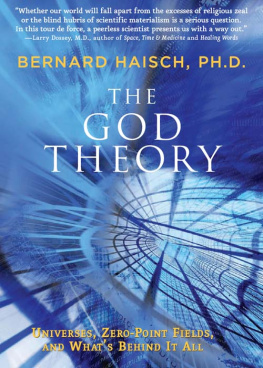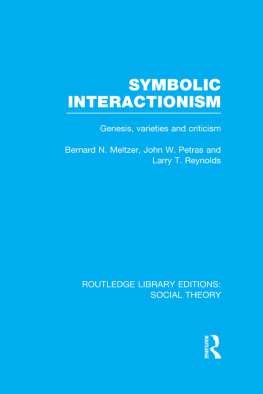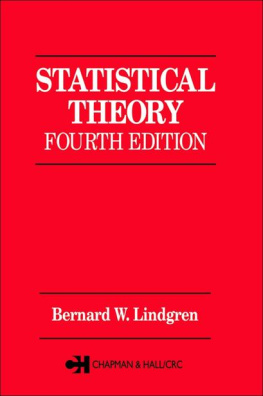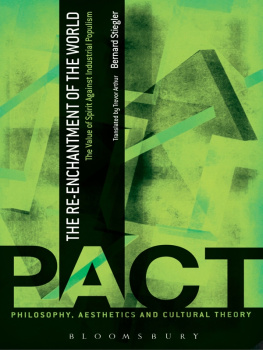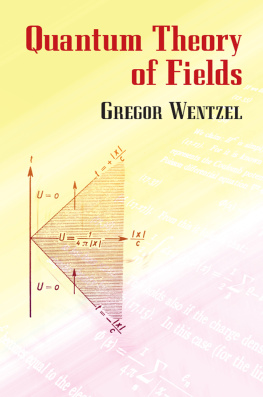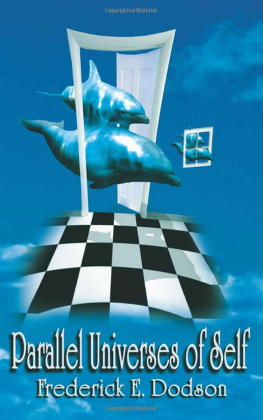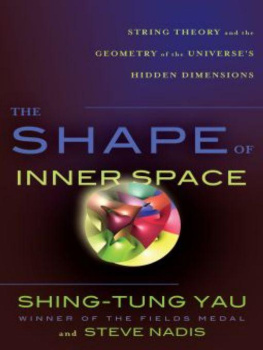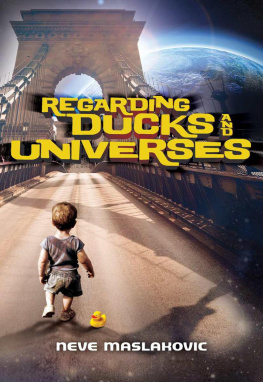Bernard Haisch - The God Theory: Universes, Zero-Point Fields, and Whats Behind It All
Here you can read online Bernard Haisch - The God Theory: Universes, Zero-Point Fields, and Whats Behind It All full text of the book (entire story) in english for free. Download pdf and epub, get meaning, cover and reviews about this ebook. year: 2009, publisher: Weiser Books, genre: Religion. Description of the work, (preface) as well as reviews are available. Best literature library LitArk.com created for fans of good reading and offers a wide selection of genres:
Romance novel
Science fiction
Adventure
Detective
Science
History
Home and family
Prose
Art
Politics
Computer
Non-fiction
Religion
Business
Children
Humor
Choose a favorite category and find really read worthwhile books. Enjoy immersion in the world of imagination, feel the emotions of the characters or learn something new for yourself, make an fascinating discovery.
- Book:The God Theory: Universes, Zero-Point Fields, and Whats Behind It All
- Author:
- Publisher:Weiser Books
- Genre:
- Year:2009
- Rating:5 / 5
- Favourites:Add to favourites
- Your mark:
- 100
- 1
- 2
- 3
- 4
- 5
The God Theory: Universes, Zero-Point Fields, and Whats Behind It All: summary, description and annotation
We offer to read an annotation, description, summary or preface (depends on what the author of the book "The God Theory: Universes, Zero-Point Fields, and Whats Behind It All" wrote himself). If you haven't found the necessary information about the book — write in the comments, we will try to find it.
Bernard Haisch: author's other books
Who wrote The God Theory: Universes, Zero-Point Fields, and Whats Behind It All? Find out the surname, the name of the author of the book and a list of all author's works by series.
The God Theory: Universes, Zero-Point Fields, and Whats Behind It All — read online for free the complete book (whole text) full work
Below is the text of the book, divided by pages. System saving the place of the last page read, allows you to conveniently read the book "The God Theory: Universes, Zero-Point Fields, and Whats Behind It All" online for free, without having to search again every time where you left off. Put a bookmark, and you can go to the page where you finished reading at any time.
Font size:
Interval:
Bookmark:
Readable and engaging, Haisch will be embraced by those concerned with finding ways of reconciling science and religion.
Booklist
In The God Theory, Bernard Haisch brings forth a new and deeper understanding of God as the consciousness creating everything that is. He is at the forefront of the new noetic sciences that are bridging the gap between Creationism, Intelligent Design, and Reductionist conventional science. He offers us a vital universal world view consistent with the spiritual experiences of the ages and the growing edge of the sciences. This understanding of the nature of reality offers hope, light, and affirmation of the subjective reality of the divine within us. It is vital knowledge for those willing to undertake the great work of consciously evolving self and society. I love the book.
Barbara Marx Hubbard, president, Foundation for Conscious Evolution and author of Conscious Evolution: Awakening the Power of Our Social Potential
A fascinating synthesis of frontier science and technology with a deeply ecumenical spirituality. Should be required reading in academic high-tech programs.
Hazel Henderson, author of Paradigms in Progress and Planetary Citizenship, former advisor, National Science Foundation, National Academy of Engineering, and the US Office of Technology Assessment (1974-1980)

This edition first published in 2009 by
Red Wheel/Weiser, LLC
With offices at:
500 Third Street, Suite 230
San Francisco, CA 94107
www.redwheelweiser.com
Copyright 2006
All rights reserved. No part of this publication may be reproduced or transmitted in any form or by any means, electronic or mechanical, including photocopying, recording, or by any information storage and retrieval system, without permission in writing from Red Wheel/Weiser, LLC. Reviewers may quote brief passages. Originally published in 2006 by Weiser Books, ISBN: 1-57863-374-5.
Library of Congress Cataloging-in-Publication Data
Haisch, Bernard.
The God theory : universes, zero-point fields, and what's behind it all / Bernard Haisch.
p. cm.
ISBN 1-57863-374-5 (alk. paper)
1. Religion and science. 2. God. I. Title.
BL240.3.H35 2006
215dc22
2005034431
ISBN: 978-1-57863-436-1
Typeset in Adobe Garamond by Kathleen Wilson Fivel
Cover design by Charette Communication Design
Cover photograph Paul Cooklin, PictureQuest
Printed in the United States of America
MV
10 9 8 7 6
The paper used in this publication meets the minimum requirements of the American National Standard for Information Sciences-Permanence of Paper for Printed Library Materials Z39.48-1992 (R1997).
A remarkable discovery has gradually emerged in astrophysics over the past two decades and is now essentially undisputed: that certain key physical constants have just the right values to make life possible. In principle these constants could have taken on values wildly different from what they actually are, but instead they are in some cases within a few percent of the just right values permitting us to exist in this universe. As Sir Martin Rees, the British Astronomer Royal and one of the world's foremost cosmologists writes in his widely read Just Six Numbers: Our emergence and survival depend on very special tuning of the cosmosa cosmos that may be vaster than the universe that we can actually see.
Science today is based on the premises of materialism, reductionism, and randomness. Materialism is the belief that reality consists solely of matter and energy, the things that can be measured in the laboratory or observed by a telescope. Everything else is illusion or imagination. Reductionism is the belief that complex things can be explained by examining the constituent pieces, such as the illusion of consciousness arising from elementary chemical processes in the brain. Randomness is the conviction that natural processes follow the laws of chance within their allowed range of behavior. Given those beliefs there is one and only one way to explain the fine-tuning of the universe. An infinite number of universes must exist, each with unique properties, each randomly different from the other, with ours only seemingly special because in a universe with different properties we would never have originated. Our existence is only possible in this particular universe, hence the tuning is an illusion.
This view suffers from three problems.
First of all, quantum fluctuations are a key ingredient of inflation theories that attempt to address how our universe, and myriad others, came into being. The problem is that quantum fluctuations presuppose the existence of quantum laws. If there truly were no quantum laws or any other laws whatsoever, nothing could happen. No laws, no action. The origin of universes as a result of quantum laws, inflation fields, or other arcane properties of string theory depends upon the preexistence of those laws or fields. And so even the skeptical scientist cannot avoid taking that on faith.
The second problem is that none of the other universes can ever be observed, not even in principle, since trying to measure across universes with different fundamental laws would be like using a microphone to observe the moon or using a telescope to record a rock band. So yet a second article of faith is required of the modern scientist: the existence of an infinite number of unseen universes.
The final problem is more personal. If we are nothing but physical beings originating by chance in a random universe, then there really can be no ultimate purpose in our lives. This is not only bad news for us individually, it undermines the ethical and moral underpinnings of society and civilization.
I propose a theory in this book that does provide a purpose for our lives while at the same time being completely consistent with everything we have discovered about the universe and about life on earth, in particular the Big Bang, a 4.6 billion-year-old earth, and, of course, evolution. The single difference between the theory I propose and the ideas current in modern astrophysics is that I assume that an infinite conscious intelligence preexists. You cannot get away from the preexistence of something, and whether that is an ensemble of physical laws generating infinite random universes or an infinite conscious intelligence is something present-day science cannot resolve, and indeed one view is not more rational than the other.
One might argue that one view is supported by evidence and the other is not. I would agree one hundred percent. The evidence for the existence of an infinite conscious intelligence is abundant in the accounts of the mystics and the meditative, prayerful, and sometimes spontaneous exceptional experiences of human beings throughout history. The evidence for random universes is precisely zero. Most scientists will reject the former type of evidence as merely subjective, but that simply reduces the contest of views to a draw: zero on both sides.
What I propose is an infinite conscious intelligenceso let's call it Godwho has infinite potential, whose ideas become the laws of physics of our universe and others, and whose purpose in so doing is the transformation of potential into experience. The difference between being able to do something and actually doing it is vast: making it happen, experiencing what it feels like, savoring the sensations are the tremendous difference between theory and practice. Playing the game is far more satisfying than reading the rules.
Font size:
Interval:
Bookmark:
Similar books «The God Theory: Universes, Zero-Point Fields, and Whats Behind It All»
Look at similar books to The God Theory: Universes, Zero-Point Fields, and Whats Behind It All. We have selected literature similar in name and meaning in the hope of providing readers with more options to find new, interesting, not yet read works.
Discussion, reviews of the book The God Theory: Universes, Zero-Point Fields, and Whats Behind It All and just readers' own opinions. Leave your comments, write what you think about the work, its meaning or the main characters. Specify what exactly you liked and what you didn't like, and why you think so.

